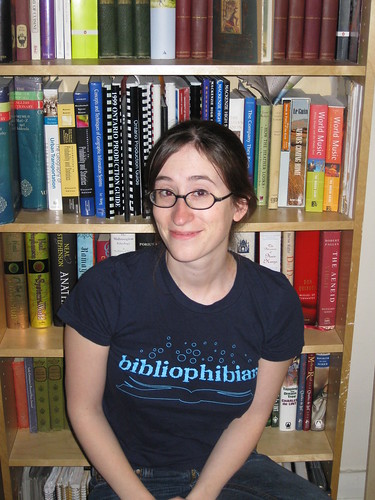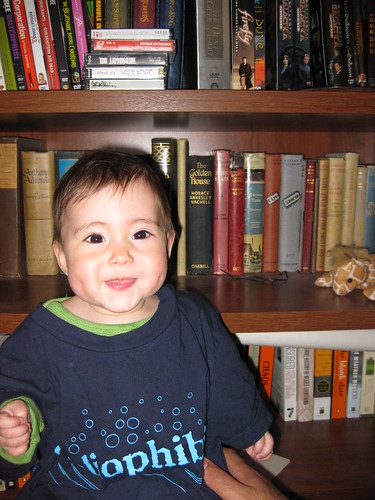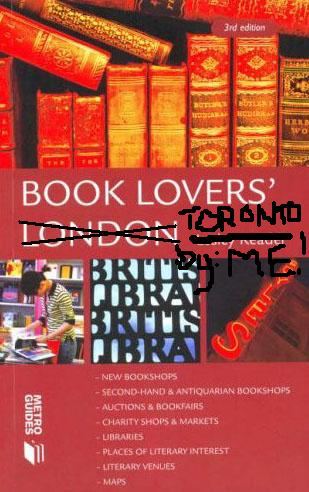April 6, 2009
Babliophibian
It has been a crazy weekend with many comings and goings, the result of which is I didn’t have time to write up my take on Val Ross’s Robertson Davies: A Portrait in Mosaic. I’ll try to have it in by Wednesday, Miss, I promise!
Meanwhile, I leave you with this:
And if you want to be extra awesome, you can buy the t-shirt, like I did.

Though in my house, it is Miss Margaret who will have to learn to sink or swim, so to speak:

April 3, 2009
The 15th Annual The Gryphon Lecture on the History of the Book (Also, a tangent)
Wednesday night the Friends of the Thomas Fisher Rare Book Library hosted the 15th Annual Gryphon Lecture on the History of the Book. This year’s lecturer was Professor J. Edward “Ted” Chamberlin and his topic was “If you are ignorant, books cannot laugh at you”, Sir John Lubbock’s Hundred Books.
Lubbock (1834-1913) was known in his time for many things, being a naturalist, the father of pre-historic archeology, the founder of “bank holidays” and a long-time member of British parliament. He was also a tireless supporter of educational rights, and as part of an ongoing effort to encourage the general public to better themselves he published The Pleasures of Life in 1887. This publication contained a list of 100 books which Lubbock felt everybody should read, a list which was transformed to reality by George Routledge & Sons who published all 100 of the books in cheap, manageable editions.

Sir John Lubbock
The somewhat odd title of the lecture was taken from the inaugural address Lubbock gave upon being appointed Principal of the Working Man’s College in 1866. I wish I could find the text of the address, which Chamberlin quoted at length, but I can’t; instead you’ll have to settle for the gist of it. Lubbock believed that reading books provided the best education a person (he was a staunch believer that women ought to be as well-educated as men) could get, since books didn’t correct, bully, preach or judge. Even if you are ignorant, he said, books will not laugh at you. He wanted books made available to all people of every stripe in order that they could encounter and examine them as equals.
You can find the list of Lubbock’s hundred books here. It’s a really fascinating list for its time, including a lot of non-European works like the Mahabharata, the Ramayana, the Shahnameh, the Qu’ran, the Shih Ching and more. The criteria for Lubbock’s list was that the book should be “satisfying and nourishing”, and ought to bring the reader pleasure. He asked many of his literate friends and eminent literati of the age to recommend what books they would like to include, and he went with a list populated by those books that got the most “votes”.
But he didn’t go with those books alone. The inclusion of many of the older and stranger works was justified because of the “time tested admiration” of hundreds of millions of readers over the years. The list was of good books, but also of popular books. For Lubbock, the most important quality of a book is that it instills a sense of wonder in the reader, and encourages them to dream.
Chamberlin’s entertaining biography painted Lubbock as a man who cared deeply for the problems facing the working class, but he was careful not to dismiss Lubbock’s literary contributions as simply populist. Now, as then (and maybe the fact that we share this sentiment with Victorians ought to tell us something), there is an attitude that Literature and Popularity are necessarily at odds, that being pleasurable is fun and an alright diversion for some (common) people, but Serious Intellectuals are wasting their time reading anything that doesn’t make them suffer. Zoe Heller was recently widely quoted for implying (or, more accurately, saying) that books with reader-friendly characters are “slightly infantile”, while Sarah Slean during this year’s Canada Reads debates insisted that she didn’t think literature was for enjoyment. As I am learning (see: right sidebar) Robertson Davies felt trapped by this prejudice as well. His daughters remember him reading Huxley and noting “ah, so you can be light and literary” and yet years later when he failed to win major recognition for his body of work (it was once or twice whispered that he was in contention for the Nobel) he believed it was because his books were “moderately comprehensible”.
Lubbock believed books were for “wonder and wondering” rather than for information or privilege. I doubt very much he meant they were exclusively for wonder and dream – just that part of the value of literature is the way it can spark the reader’s imagination and inspire her.
“Inspiration” is one of those words that has got a bit of a raw deal lately, having been (to borrow Heller’s term) “Oprahfied” to mean 7 Ways to Get to Yes (with Chicken Soup) rather than the breath of originality that separates a work of routine from a work of greatness. Do we let books inspire us anymore? And when was the last time you read a book that you could call inspired? While there has been excellent writing on the offer in recent years’ fiction, I can’t honestly say I’ve seen or heard of much really inspired writing. It seems to me that it is easier for a writer to antagonize the reader than it is to inspire her. I’ve read a lot of “great” books from lauded authors in the last five years which read like a litany of the worst things that can happen to a person, invariably written by people who’ve never suffered much at all but who imagine that hardship must be something like Fear of Death or Godlessness or some other engrossing concern of the awakening adolescent. Not enough tragedy for you? Well, throw a drug addiction in there. And take ten years off the life of the protagonist. Make her sixteen. No, fourteen. Ah hell, twelve. And we need at least one rape and maybe some incest. Now we’re getting somewhere, this is the soul of humanity! (*tongue in cheek*)
It’s a hell of a lot harder to delight and transport the seasoned reader. To write that book that lodges itself in the heart of the reader and becomes the catalyst that changes her life. A lot of books claim to “change the reader’s life”, but how many really do? I can say I’ve had my life changed by a special couple. And I’d love to come across another someday.
George Steiner said, not very long ago, “I don’t find literature very exciting at the moment…Not all periods have major literary genius.” A sad sentiment. Perhaps we need a little more of Sir John Lubbock’s imagination and enthusiasm today; a new 100 Books picked, this time, for pleasure. An inspiring list for today’s writers and intellectuals to remind us that wonder, optimism and enjoyment aren’t naughty words and aren’t just the indulgences of idle people.
April 1, 2009
Book Lovers’ Toronto: Introducing the “Events” Tab
A couple of years ago I found myself in London (England) for exactly one day. It was a tough choice, but I opted to spend the day engaged in bibliotourism. This was made a great deal easier by a book I’d picked up in town: Book Lovers’ London by Leslie Reader.
This book is a gem. With no trouble at all I’d mapped out a route through as many used and rare book stores as I could get to, and was able to see an unbelievable exhibit of Holy Books put on by the British Library (including Gutenburg Bibles, scraps of the Dead Sea Scrolls, the Qur’an of Emperor Babar and much more). I assumed the book was part of a series, and planned to get copies of Book Lovers’ guides to other cities.
I’ve since come to the disappointing realization that Book Lovers’ London is the only book lovers’ guide out there. But every empty gap is a great opportunity, right? I’d like to make a case for a Book Lovers’ Toronto.

You’d never know it, but Toronto is a fantastic city for the bibliophile. From its world-class events like the International Festival of Authors and Luminato and the literally hundreds of signings and readings around town to world-famous booksellers, collections and book sales, Toronto has enough book sites, events and exhibits to keep a bibliotourist entertained for a week.
Toronto is home to the fourth-largest University library system in North America (after Harvard, Yale & Illinois), including the largest repository of publicly accessible rare books and manuscripts in Canada. We house Canada’s major collection of speculative fiction and popular culture as well as Canada’s oldest science fiction bookstore. We have neighbourhoods where so many internationally-acclaimed writers live that the area is affectionately referred to as the “Writer’s Block“. We have statues of our poets and small presses open to the public. We have had two books written on that subject – Toronto – A Literary Guide by Greg Gatenby and Writer’s Map of Toronto by John Colombo (not entirely up to date either of them – nevertheless.) And on and on.
The “new book” events – the Festivals, the signings and the readings – are fairly well covered in the media. Publishers and promoters put a lot of money, time and effort into getting the word out there. As much as we’d like to think the aim of these events is literacy and cultural edification, they’re also really about selling books and that’s a cause that seems to justify publicity.
But on the used-and-rare end of the book spectrum we have a less cohesive “scene”. No one giant body stands to make money from these exhibits and events and no PR people are employed. Rare book people – sorry kids – are also an eccentric and slightly antisocial lot and tend not to strive for inclusion. The product – old things – also doesn’t lend itself to a media-savvy, internet prevalent crowd. This hurdle didn’t stop Leslie Reader, though, and it won’t stop me. So I introduce to you the Events Tab.
I have tried to collect a comprehensive list of books events and exhibits which might otherwise fall between the cracks, events not loudly trumpeted by their sponsors. Most of the listings are exhibits but I’ve also tried to compile a list of book fairs and sales in the area. Whether you are a native Torontonian who didn’t realize these events were available for your enjoyment or a visitor looking to absorb another dimension of the city’s rich literary offerings, I hope you will find these listings useful. And I’d love to add more! Always feel free to email me at charlotte@once-and-future.com if you think I should list something I might have missed.
